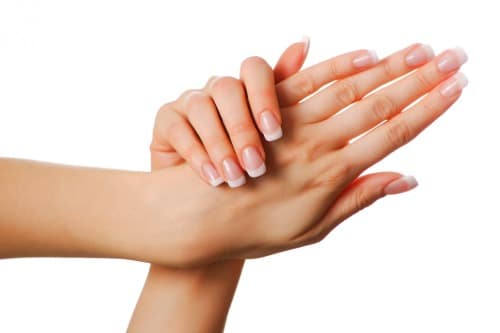If there is one thing that most people pay close attention to when it comes to cleanliness, it is their hands and nails. Relatively speaking, it is commonly understood that not only are hands an effective way to communicate non-verbally, but they can also communicate overall hygiene in general.
Clean hands and proper nail care are a reliable and good indicator of good hygiene and grooming. Well groomed nails and soft skin make a significant statement about your lifestyle and personal self-care.
Regular manicures are beneficial to keep your nails healthy, beautiful, clean and presentable. With proper nail care, the occurrence of infections and hangnails are dramatically diminished.
So, who doesn’t feel better when they have a beautiful set of Acrylic Nails or perfectly polished Shellac or Vinylux manicure to show off? Going to your favorite nail salon is the ultimate in getting professional nail care and pampering! That is what The Nail Lady is all about!!
Check out these helpful tips to keep your nails and hands clean, healthy and beautiful:
- Polish the nails with a top coat or ridge filler in-between manicures to help protect the nails and prevent breaking and splitting and also extend the durability of your manicure.
- Moisturize your nails and cuticles with solar oil to help prevent hangnails, cracking of the skin and peeling of the nail.
- Wear gloves to protect your nails and cuticles from housework, gardening and washing dishes.
- Be cautious when doing office work. Nails and cuticles take a beating filing, opening letters, typing and handling papers. Paper products are very drying to your hands and nails.
- Apply hand cream frequently, especially after washing your hands and pay attention to the cuticle area. Hempz cremes and lotions are incredible moisturizers!
- Wear a sunscreen during the day on your hands and cuticles to prevent sun damage. Reapply every time you wash your hands.
- Meticulously clean all nail implements and change nail files often. Bacteria and other microbes can get transferred by the nail tools you use, causing infection or harm to the matrix.
- Disinfect any tears or cuts to the cuticle, and treat ingrown nails as soon as possible. Nail infections are not only unsightly, but also can cause long-lasting damage to the nail. Any drugstore antibacterial ointment, such as Polysporin, Neosporin or Bacitracin, will help to heal.
- Avoid nail products that contain formaldehyde or toluene. The Nail Studio only uses Formaldehyde and Tolulene Free products and nail polishes.
- Nails are “Jewels Not Tools” Do not use fingernails as tools to pry things open such as pop cans, removing keys from the ring, opening letters or scraping off labels.
- Do not use your fingers as letter openers. This can dry cuticles and cause hangnails and affect nail growth and strength.
- Do not soak nails for long periods, and never use any kind of soap or detergent when soaking. Nails and cuticles that become engorged with water weaken, and the longer soap or detergent is in contact with skin and nails the greater the potential for damaging the nail and cuticle structure. (despite the old Madge advertisements for Palmolive dish detergent)
- Do not overuse any kind of nail-polish remover. Use a minimal amount on the nail and avoid getting too much on the cuticle and skin.
- Do not push the cuticle back too far. Quick tip….After showering, gently push back your cuticle with the corner of your bath towel.
- Only use properly sterilized tools. The importance of this step cannot be stressed enough. Risking your health and well-being for a manicure is just not worth it, and that is a definite possibility with bacteria-laden nail instruments!
- Do not pull or tear at hangnails. Gently cut them away, leaving the cuticle intact to avoid any possible infection.
- Be aware of nail or cuticle inflammation or redness. If there are any signs of infection, disinfect the skin as soon as possible with an antibacterial or antifungal ointment. Any change to the nail’s appearance should be checked out by a qualified dermatologist.
